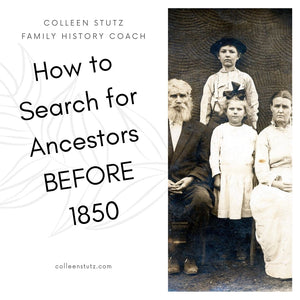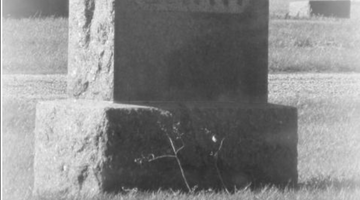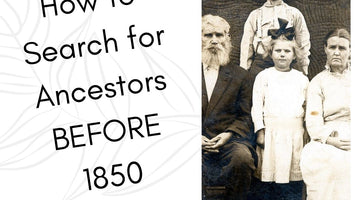When researching Family History, lots of people get stuck searching for an ancestor when their ancestor lived before 1850. Why is this? Well, 1850 was the first Census that listed every name in each household. Before that, it was only heads of the household listed, and then there were tick marks for each gender and age group in the house. So when you have a common last name, it makes it tricky to narrow down your search, and it's easy to give up.
Here are some tips for searching before 1850.
1. Marriage records. Marriage records are the earliest vital records that were kept in the US. They can be found online at Ancestry.com or FamilySearch.org, and they can also be tracked down in state archives, county clerk offices, and local churches. Some marriage records have the ages of the bride and groom, where they are from, and some even provide their parents' names!
2. Probate records. These are records that were created when people died--mostly the head of the household/land owner/homeowner. Sometimes people wrote wills, that included names of family members to help you get clues. So you could search for probate records of people with the same last name in the area you are searching. Even if they didn't have a will, there could be guardianship records if their kids were minors when they died, or administration papers recording debts to be paid. All of these will have clues of family and friends that you can follow to find more clues. There are some probate records that are searchable on Ancestry.com, but most are hidden on FamilySearch.org in a sneaky spot. I'll write on that in another post. You can also find them at the county courthouses and state or county archives.
3. Land records. These records are often overlooked. Sometimes there's no obvious clues to be found, but if you look close, there's always something helpful. The land records will outline exactly where the land is located. If it's in the East, it will be measured by metes and bounds. If it's more West, it will be in Sections and Ranges. When you find a land deed, the guarantor is the seller, and the guarantee is the buyer of the land. Often family members would buy and sell land from each other, so that could give you some clues. But if you pay attention to the piece land and see who borders it, who it's being sold to, etc. you may find the clue you're looking for.
4. Cemetery records. Hey, I love FindAGrave as much as the next gal, but if you're not looking deeper you're missing clues. When you find an ancestor buried in a cemetery, over to the right there is an option to search everyone buried in that cemetery with the same last name. Look for people buried in the same plot or area. They are most likely family members. Look for babies who might have died between census years. Look for people buried close by that may have been the parents of a distant grandmother whose maiden name you're looking for. And then, if you find anything (or nothing), contact the cemetery! Often they hold records with more information that's not available online!
There are so many ways to research ancestors before 1850. These are just a few ideas.




